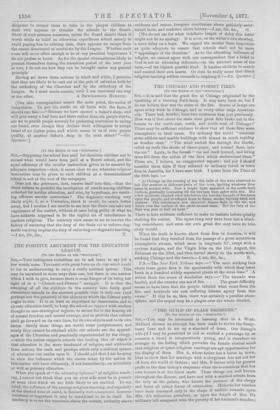THE POSITIVE ARGUMENT FOR THE EDUCATION LEAGUE.
[To THE EDITOR OF THE "SPEOTATOR."] Stn,—Your indulgence emboldens me to ask leave to say yet a few words more. You insist with great force on the time which would be lost in endeavouring to carry a really national system. This may be answered in more ways than one, but there is one answer which I wish to give, because there is some danger of its being lost sight of in a " Church-and-Dissent " struggle. It is that the sweeping of all the children in the country into fairly good elementary schools in the shortest possible time is only one (and perhaps not the greatest) of the objects at which the Liberal party ought to ann. It is at least as important to democratize and to elevate education itself, to keep the school en rapport with modern thought in non-theological regions, to secure for it the bracing air of mental freedom and mental courage, and to provide that culture shall go forward on its own lines, for its own objects and to its own issues. Surely these things are worth some postponement, and surely they cannot be attained while our schools are the append- ages of the Churches and practically superintended by the clergy, —while the nation supports schools the leading idea of which is that education is the mere handmaid of religion, and withholds from culture the rank and prestige which only a national system of education can confer upon it. I should add that I am keeping in view the influence which the course taken by the nation in this matter will have ultimately, if not immediately, on secondary as well as primary education.
When you speak of "the educating influence" of religious teach- ing, I cannot but think that you on your side must be in pursuit of some ideal ivhich we are little likely to see realized. To my mind, the influence of the average religious teaching, and especially of the clerical tone of mind, is distiuctly anti-educational, however necessary or important it may be considered to be in itself. Its tendency is to set the uncertain above the certain, authority above
evidence and reason, foregone conclusions above patiently-ascer- tained facts, and tradition above history.—I am, Sir, &c., 0.
[We do not see for what indefinite length of delay this letter- might not be an apology. It is even, on the writer's own showing, a mere delay on a hope. We regard the secular State inspection as quite adequate to ensure that schools shall not be mere "appendages of the churches." As to the educating influence of religion, we cannot agree with our correspondent that a belief in God is not an educating influence,—in the strictest sense of the- term,—of the highest possible kind. It teaches children to search and control their own hearts. Or does he really mean that direct religious teaching seldom succeeds in inspiring it ?—En. Spectator.r


































 Previous page
Previous page